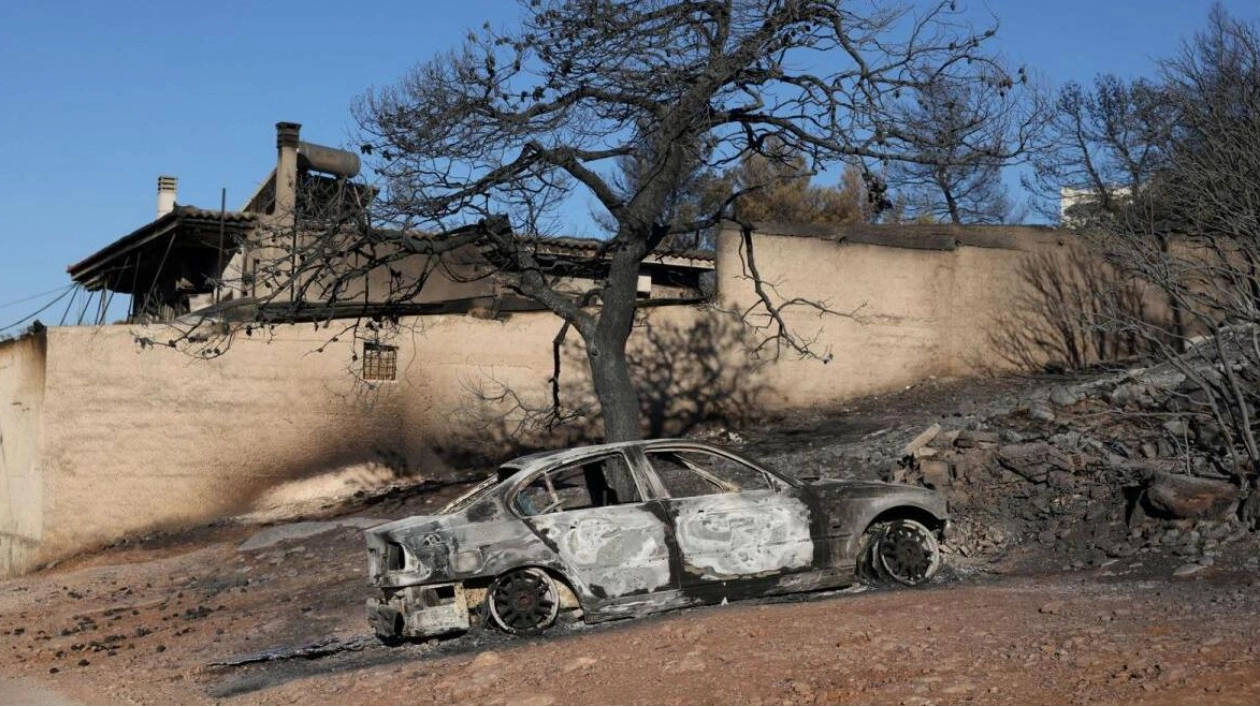Greece's most severe wildfire this year claimed the life of a woman as it persisted in burning on the outskirts of Athens on Tuesday, despite authorities reporting a decrease in its intensity due to milder winds and firefighting efforts. Hundreds of firefighters, supported by six waterbombing aircraft, fought the fire that erupted on Sunday near the village of Varnavas, 35km north of Athens. Driven by strong winds, the fire spread from a hilly area into the suburbs on Monday, destroying homes and causing panic in neighborhoods that hadn't experienced such a close fire in decades.
"I've lived here for 35 years, and a fire had never reached this area," said Meletis Makris, a 65-year-old pensioner in Vrilissia. Prime Minister Kyriakos Mitsotakis is set to lead a ministerial meeting later on Tuesday. The Greek government has declared compensation and relief measures for those who have lost homes or property. By Monday afternoon, the fire had reached the suburb of Vrilissia, approximately 14km from central Athens, where a 64-year-old woman was found dead inside a factory, according to witnesses.
The cause of the wildfire remains undetermined, but the intense fires seen on Monday had diminished, and the thick smoke that enveloped central Athens had mostly cleared. "There is no active front, but scattered outbreaks," said Climate Crisis and Civil Protection Minister Vassilis Kikilias in a televised statement. However, strong winds are expected to return later on Tuesday, and the country will remain on high fire alert until Thursday, with temperatures forecast to reach up to 40 degrees Celsius.
Wildfires are a recurring issue in Greek summers, with the deadliest one in 2018 killing 104 people in the seaside town of Mati. Climate change has exacerbated the situation with hotter weather and less rain, creating ideal conditions for widespread fires. Greece experienced its warmest winter on record this year and is on track for its hottest summer, with little rain in many areas for months.
"The wildfire had all the characteristics that we, as firefighters, don't want a forest fire to have. A combination of hot, dry, and windy (conditions)," said Nikos Lavranos, head of the Greek federation of fire service employees, to Greek TV. "It was extremely aggressive, difficult to manage, and unpredictable," he added. Fires amid hot weather have also erupted across southern Europe this summer, including in Spain and the Balkans.
Greece's National Observatory reported that satellite images showed the fire had damaged around 10,000 hectares of land, including 100 homes, according to local newspaper Proto Thema. Residents and firefighters returned to some areas of northern Athens on Tuesday to assess the damage—kitchens and living rooms blackened by fire, ceilings collapsed, and cars reduced to sooty frames.
"My house was utterly destroyed, even the walls fell down. There's nothing left," said Sakis Morfis, 70, a Vrilissia resident. "The only thing I cared about was saving my dogs, so I left everything (else) behind." More than 30 areas were evacuated, along with at least three hospitals, with power cuts in parts of the wider Athens region. Greece has activated the European Civil protection mechanism and is expecting assistance from France, Italy, and the Czech Republic with aircraft and firefighters. Spain and Turkey have also offered help.
The measures announced by the climate crisis and civil protection ministry on Tuesday include rent subsidies, a three-year property tax exemption, and financial aid to restore damaged homes and businesses. Opposition parties accused the government of not doing enough to prevent the disaster. Syriza, the leftist main opposition party, questioned the number of aircraft battling the blaze. The socialist Pasok party said Greeks were paying the price of poor fire prevention policies.






